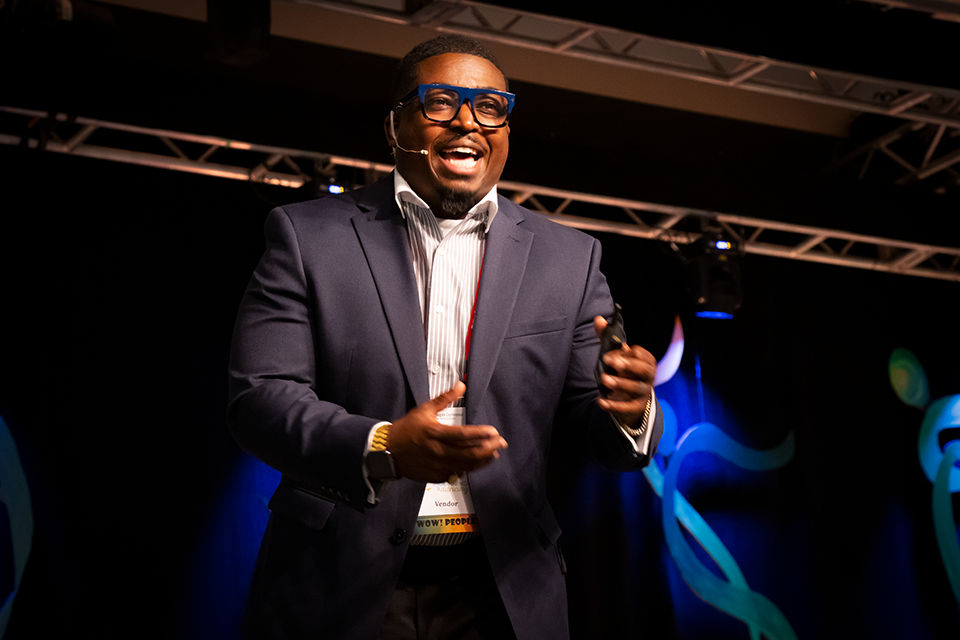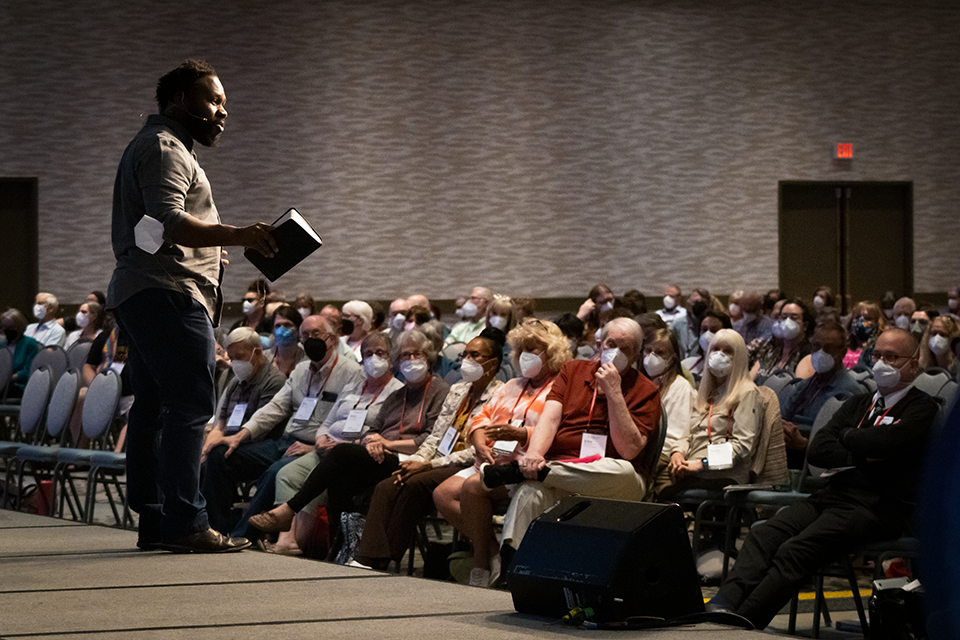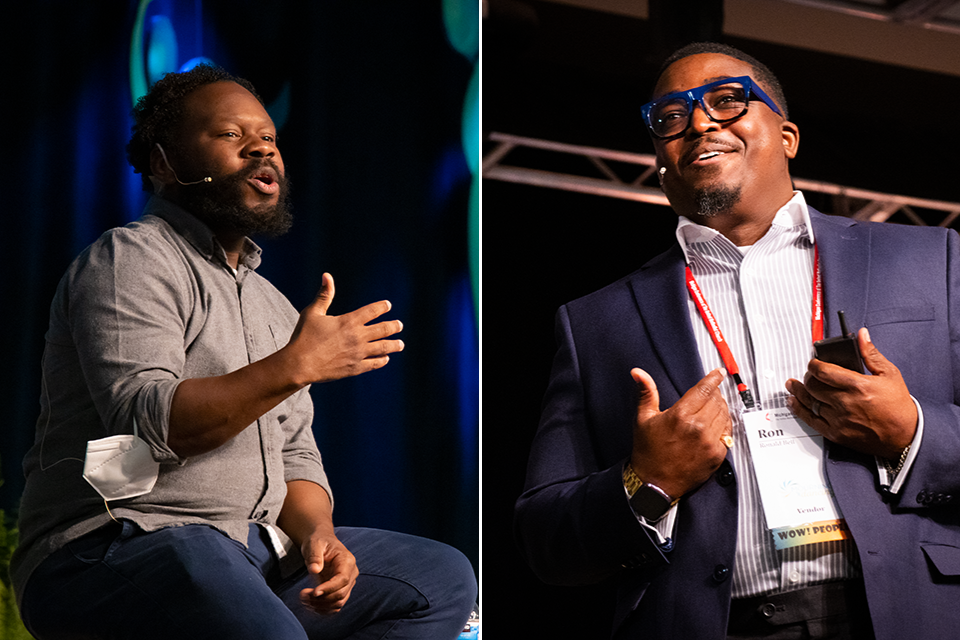The Rev. Dr. Ron Bell and Derrick Scott II were keynote speakers during the 2022 Michigan Annual Conference. Both proclaimed resilience as a gift from God for bold ministry in the world.
JAMES DEATON
Content Editor
June 3, 2022 | ACME, Mich.–Rev. Dr. Ron Bell and Derrick Scott III proclaimed messages of resilience during separate teaching sessions at this year’s Annual Conference. Both brought insightful training to equip individuals to become bold and effective leaders for the church.
Teaching Session with Ron Bell
Bell is Senior Pastor of Camphor Memorial UMC, St. Paul, MN, and a published author and columnist. Two of his most popular books deal with his work with grief and trauma. His latest book, The Four Promises: A Journey of Healing Past and Present Trauma, provides concrete and thoughtful steps to help us engage whatever trauma we’ve experienced and heal.
During his teaching session on Friday morning, Bell spoke honestly about the truth that we’re all tired, weary, and worried. But societal pressures have caused us to give rote, mechanical answers when we’re asked how we’re doing. Bell explained further, “We struggle to give human answers because we’ve got to be machines. Problem with iron man theology is that it’s not real and doesn’t last. And so, we struggle because we haven’t accepted the reality that we’re human, we’re flawed, and that’s okay.”

Bell encouraged his listeners to open up and accept the human emotions God has given. “God made us with all of these emotions we’ve been trying to hide and hold on to. The ones that are messy we tuck away and try to hide. It’s a contradiction to try to hide the gifts the Maker gave us and not express them.” Human emotions—all of them—are gifts from God, and God modeled them through Jesus and his example.
By honoring the painful emotions we have experienced, and by accepting our imperfections, we begin to take care of our “container,” our whole self. This is the soul work needed for expanding our capacity for life and ministry with others, and we become resilient in life’s storms. “If we can expand on what God has given us, we can experience the joy of the Lord in the midst of the sorrow and the pain,” Bell concluded.
Bell ended his teaching session by providing five resilience practices that are helpful when we are seeking to expand our capacity for ministry.
-
- Breath work, 5:5:7. Regulated breathing helps your brain and body work better together. Slowly breathe in for five seconds, hold for five, and then exhale for seven.
- P-I-E-S. Ask this question as a way of engaging how the condition of your “container” is: How are you physically … intellectually … emotionally … spiritually?
- Stretching. Human bodies draw themselves in when they experience pain and trauma. When you stretch, you are acknowledging it’s a safe place. You can relax here.
- Four Corners. If you feel closed in, compacted, imagine a square around you. In every corner, put a word: God loves me, my family loves me, my significant other loves me, I am loved. Step into a corner and be fully present because you are loved.
- Hand and Water/Breath. Look at your hands and think of all the different things you are asked to hold. What do you wish you could put your hands on? What do you want to get rid of? Study your hands, and then wash them or blow on them if water is unavailable.
Breakout sessions in response to Bell’s message followed Friday’s teaching session.
Laity Event featuring Derrick Scott
Derrick Scott’s enthusiasm for lay ministry during last year’s Laity Event led Conference leadership to invite him back, this time in person. Last year’s event was virtual. Michigan Conference Lay Leader Annette Erbes hosted the Laity Event held Friday afternoon and introduced Scott to those attending.

Scott is the Executive Director and United Methodist Campus Minister for the Campus to City Wesley Foundation in Jacksonville and St. Augustine, FL. He is a lay person who has been leading ministry to college students and young adults for more than 18 years.
Most recently he has been passionate about the intersection of faith and mental health and has developed a variety of community resources for young adults through The Wellness Project. This creative experience in resourcing young adults in mental health matters provided the background for his teaching session to the laity at Annual Conference.
Scott began by affirming the Annual Conference theme, “Mourning to Dancing,” and celebrating the ministry of lay members. “As the laity, you are the power in the pew, the gospel on the ground.” He then urged everyone to watch Annette Erbes’ laity report that was recorded prior to Conference. In that report, she named the lay ministry, “our servant ministry [that] is faithful, caring, grace-filled, and resilient!” She then told several stories of Resource and Training Mini-Grants given by the Board of Laity being utilized in extraordinary ways.
Inspired by these Michigan stories, Scott asked everyone to grab a neighbor and take two minutes to answer this question: What has resilience looked like in your congregation, your context? Once everyone came back together, he pointed to the need for bold leaders. “So many people are looking for leaders that have the ability to move forward, even though life is hard. Lean in and be an incredible witness of Jesus Christ. It will take resilience.”
Scott turned to more practical matters as he outlined parameters for building spaces of resilience in congregations. He admitted that we will have to be patient with ourselves and each other. Life is tough and becoming resilient is not a one-time event. “One of the processes, is this invitation to hold space for people’s stories. If we’re going to go from mourning to dancing, we must do this. We’re going to have to find a way to not just get through the agenda. Find a way to create the space, hold the space, so that we can hear what’s really going on in our lives, in the lives of people in our communities.”
The story of Peter and John’s interaction with the man born lame in Acts 3 became a primary scripture as Scott illustrated the power of an individual’s story. Peter and John held space for this man who waited daily at the gate of the temple asking for alms. The apostles did not try to edit or change the man’s story. They looked at the man and received his story: “Peter looked intently at him, as did John, and said, ‘Look at us’” (v. 4). And then the miraculous happened as Peter grabbed the man by the hand, proclaimed his healing, and raised him up. The man born lame jumped up and down and praised God.
Scott invited everyone to chat with a neighbor and answer a second question: Who is the person in your world who knows how to hold space for people? This kind of safe space has three characteristics:
-
- Held space is sacred space. Treat people’s stories as sacred. Hold space for honesty.
- Held space is slow space. Don’t rush someone’s story. Healing doesn’t happen overnight.
- Held space is open space. Our job isn’t to fix or change anything or anyone. Allow the story to be told and honored.
“Holding space,” Scott reminded laity, “is a form of discipleship. It’s the way of Jesus Christ.” He ended his time by calling out three groups to hold space for:
-
- Young adults. The church learns so much when it listens to young adults.
- Clergy. Some lay members are cruel to clergy. Stand up and do not sit by.
- You. We can’t lead people from mourning to dancing if that space isn’t held for us.
Last Updated on January 30, 2024

